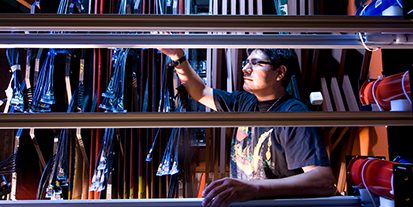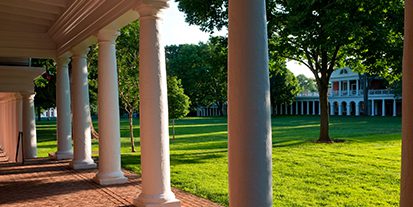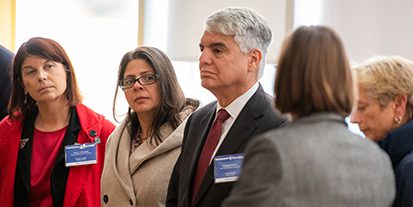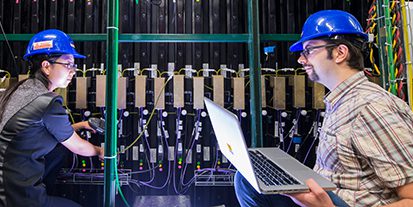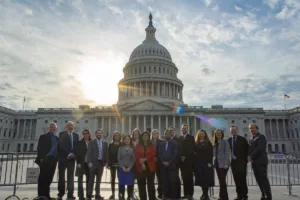2023 Undergraduate Women in STEM Interns
2023 Undergraduate Women in STEM Interns
URA is pleased to announce five outstanding students have been selected for the inaugural Undergraduate Women in STEM program. The program will engage women from under-represented groups in science and engineering at Fermi National Accelerator Laboratory (Fermilab). Find out more about our interns below.
Loaiza Medina, University of Puerto Rico
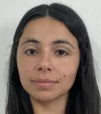 Loiza is an industrial engineering student at the University of Puerto Rico. During the internship, she will work in the Infrastructure Services Division (ISD). Fermilab’s ISD builds and maintains mission-critical infrastructure and services from which high-energy physics research can be safely accomplished without interruption.
Loiza is an industrial engineering student at the University of Puerto Rico. During the internship, she will work in the Infrastructure Services Division (ISD). Fermilab’s ISD builds and maintains mission-critical infrastructure and services from which high-energy physics research can be safely accomplished without interruption.
Within the Division is ISD Engineering, Fermilab’s in-house Architectural/Engineering (A/E) firm. ISD Engineering provides expertise on conventional facility design and construction activities and directs outside A/E services. ISD also hosts Facility Management and Logistics and the Property Services Department.
During the internship, Loaiza will develop and implement standard operating procedures for various operational activities; support facility layout and design planning and coordination; perform data collection; develop and implement preventive maintenance programs; monitor key performance indicators (KPIs); and support the overall projects led by the Division.
Victoria Nnaji, Purdue University
 Victoria Nnaji is a computer information science student at Purdue University. During the internship, she will be analyzing and characterizing preexisting millimeter-wavelength maps from the SPT-3G cosmic microwave background experiment to identify galaxy clusters via the Sunyaev-Zel’dovich effect. Her work will contribute to the detection of undiscovered, high-redshift low-mass galaxy clusters and support large-scale experiments such as the Long-Baseline Neutrino Experiment/Deep Underground Neutrino Experiment (LBNF/DUNE).
Victoria Nnaji is a computer information science student at Purdue University. During the internship, she will be analyzing and characterizing preexisting millimeter-wavelength maps from the SPT-3G cosmic microwave background experiment to identify galaxy clusters via the Sunyaev-Zel’dovich effect. Her work will contribute to the detection of undiscovered, high-redshift low-mass galaxy clusters and support large-scale experiments such as the Long-Baseline Neutrino Experiment/Deep Underground Neutrino Experiment (LBNF/DUNE).
During the program, Victoria will apply Python and preexisting spt3g_software tools and packages to characterize, down-select, and preprocess SPT-3G map data, which is necessary for SZ-cluster identification and analysis. Extensions to this work include cross-correlation analyses of the produced SPT-3G cluster samples against previous SZ catalogs to characterize the fidelity and/or systematic uncertainties of the resultant sample.
Ajeya Dison, Norfolk State University
 Ajeya Dixon is a chemistry student at Norfolk State University. During the internship, she will be working at Fermilab’s Superconducting Quantum Materials and Systems Center (SQMS), one of five research centers funded by the U.S. Department of Energy that are a part of a national initiative to develop and deploy the world’s most powerful quantum computers and sensors.
Ajeya Dixon is a chemistry student at Norfolk State University. During the internship, she will be working at Fermilab’s Superconducting Quantum Materials and Systems Center (SQMS), one of five research centers funded by the U.S. Department of Energy that are a part of a national initiative to develop and deploy the world’s most powerful quantum computers and sensors.
Fermilab’s SQMS is exploring quantum building blocks and gaining a fundamental understanding to advance the performance of quantum devices.
Ajeya will perform a variety of materials characterization measurements to understand the impact of different nanofabrication processing schemes. This includes the use of techniques such as time-of-flight secondary ion mass spectrometry (TOF-SIMS) to understand how surface and structural defects and impurities are being introduced as well as how they can be eliminated in the future.
Ariela Yashinsky, Michigan State University
 Ariela Yashinsky is a mathematics student at Michigan State University. During the internship, Ariela will work with Fermilab’s Particle Physics Division (PPD) on the Compact Muon Solenoid (CMS) project that is focusing on the search for two new particles: X and Y. The new particle X decays to a Higgs boson (H) while particle Y decays into a bbγγ final state with boosted jets. The proposed project will also focus on a search for new physics using the final state involving X->H(bb)Y(γγ) final state.
Ariela Yashinsky is a mathematics student at Michigan State University. During the internship, Ariela will work with Fermilab’s Particle Physics Division (PPD) on the Compact Muon Solenoid (CMS) project that is focusing on the search for two new particles: X and Y. The new particle X decays to a Higgs boson (H) while particle Y decays into a bbγγ final state with boosted jets. The proposed project will also focus on a search for new physics using the final state involving X->H(bb)Y(γγ) final state.
Ariela will work closely with the ongoing analysis group at the LPC, comprised of researchers from Fermilab, Caltech, and UCSD. In addition, Ariela will support the improvement of machine learning methods; explore additional low-level input information to improve the classification performance; and validate the new boosted dijet triggers.
Sarah Marmolejos, Wake Forest University
 Sarah Marmolejos is an engineering student at Wake Forest University located in North Carolina. During the internship, Sarah will work on streaming infrastructure for frequency multiplexed sensors. This work will support a myriad of large-scale experiments hosted at Fermilab that require high scalability.
Sarah Marmolejos is an engineering student at Wake Forest University located in North Carolina. During the internship, Sarah will work on streaming infrastructure for frequency multiplexed sensors. This work will support a myriad of large-scale experiments hosted at Fermilab that require high scalability.
During the internship, Marmolejos will test Microwave Kinetic Inductance Detectors (MKIDs) in a real experiment environment. MKIDs are widely used in large-scale experiments that require high scalability for their possibility to assemble small detector chips with hundreds or thousands of detectors. This is achieved through using a single radio frequency feed line for exciting and reading out the individual detectors. Developed by Fermilab Quantum and Astrophysics Systems Department, a field-programmable gate array-based (FPGA) firmware allows high integration of all the components needed for reading these sensors. Marmolejos will develop the Phyton code running on the FPGA processor.

